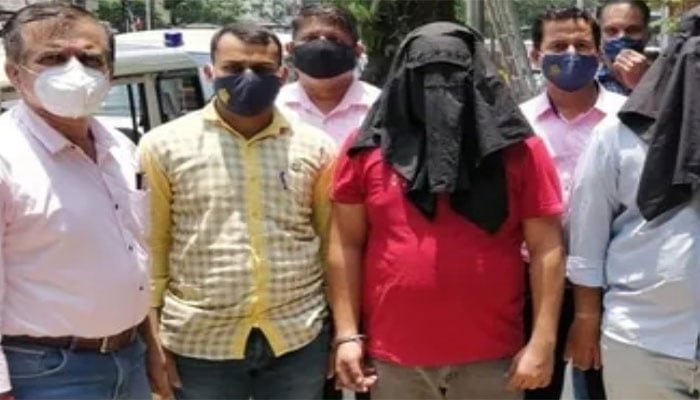Loose state control of uranium in India raises many questions
ISLAMABAD: The seizure of more than seven kilograms of natural uranium from two unauthorised persons in the Indian state of Maharashtra has raised many questions regarding the state's control over this highly sensitive radioactive material.
Uranium was recovered from two individuals in Maharashtra on May 5, the Bhabha Atomic Research Center of India confirmed the uranium seized was highly radioactive and pure.
Dozens of incidents of collective and individual uranium theft and smuggling have taken place in India on which several countries, including the United States and the Organization for the Prevention of Nuclear Terrorism, have expressed their concern.
Earlier, in 2016, Indian police arrested two persons in the Thane area and recovered eight kilograms of raw uranium from their possession. According to experts, terrorists detonate radioactive material by combining it with any conventional weapon, which called “dirty bomb”.
Although the damage caused by a dirty bomb blast will not be as great as that of an atomic bomb, there will be potential for radiation and prolonged contamination in and around the site of the bombing.
Experts say the radioactive material used in the “dirty bomb” is not very pure uranium, but can be obtained from any radioactive source, used in medicine or industry.
More than seven kilograms of natural uranium, used in low and high power nuclear reactors and worth Indian rupees 21 crore (PKR519 million), has been out of the Indian government's grasp, the situation is alarming for the world as well as the nuclear watchdogs.
-
 Prince William Warned His Future Reign Will Be Affected By Andrew Scandal
Prince William Warned His Future Reign Will Be Affected By Andrew Scandal -
 Amy Madigan Reflects On Husband Ed Harris' Support After Oscar Nomination
Amy Madigan Reflects On Husband Ed Harris' Support After Oscar Nomination -
 Is Studying Medicine Useless? Elon Musk’s Claim That AI Will Outperform Surgeons Sparks Debate
Is Studying Medicine Useless? Elon Musk’s Claim That AI Will Outperform Surgeons Sparks Debate -
 Margot Robbie Gushes Over 'Wuthering Heights' Director: 'I'd Follow Her Anywhere'
Margot Robbie Gushes Over 'Wuthering Heights' Director: 'I'd Follow Her Anywhere' -
 'The Muppet Show' Star Miss Piggy Gives Fans THIS Advice
'The Muppet Show' Star Miss Piggy Gives Fans THIS Advice -
 Sarah Ferguson Concerned For Princess Eugenie, Beatrice Amid Epstein Scandal
Sarah Ferguson Concerned For Princess Eugenie, Beatrice Amid Epstein Scandal -
 Uber Enters Seven New European Markets In Major Food-delivery Expansion
Uber Enters Seven New European Markets In Major Food-delivery Expansion -
 Hollywood Fights Back Against Super-realistic AI Video Tool
Hollywood Fights Back Against Super-realistic AI Video Tool -
 Pentagon Threatens To Cut Ties With Anthropic Over AI Safeguards Dispute
Pentagon Threatens To Cut Ties With Anthropic Over AI Safeguards Dispute -
 Meghan Markle's Father Shares Fresh Health Update
Meghan Markle's Father Shares Fresh Health Update -
 Samsung Galaxy Unpacked 2026: What To Expect On February 25
Samsung Galaxy Unpacked 2026: What To Expect On February 25 -
 Travis Kelce Takes Hilarious Jab At Taylor Swift In Valentine’s Day Post
Travis Kelce Takes Hilarious Jab At Taylor Swift In Valentine’s Day Post -
 NASA Confirms Arrival Of SpaceX Crew-12 Astronauts At The International Space Station
NASA Confirms Arrival Of SpaceX Crew-12 Astronauts At The International Space Station -
 Can AI Bully Humans? Bot Publicly Criticises Engineer After Code Rejection
Can AI Bully Humans? Bot Publicly Criticises Engineer After Code Rejection -
 Search For Savannah Guthrie’s Abducted Mom Enters Unthinkable Phase
Search For Savannah Guthrie’s Abducted Mom Enters Unthinkable Phase -
 Imagine Dragons Star, Dan Reynolds Recalls 'frustrating' Diagnosis
Imagine Dragons Star, Dan Reynolds Recalls 'frustrating' Diagnosis




